How Ukrainian pets bring solace for some refugees but heartbreak for others
David Cohen has witnessed first hand the devastating impact of pets having to be abandoned as well as the joy they bring to those Ukrainians who have been able to flee the Russian invasions with their pets in tow
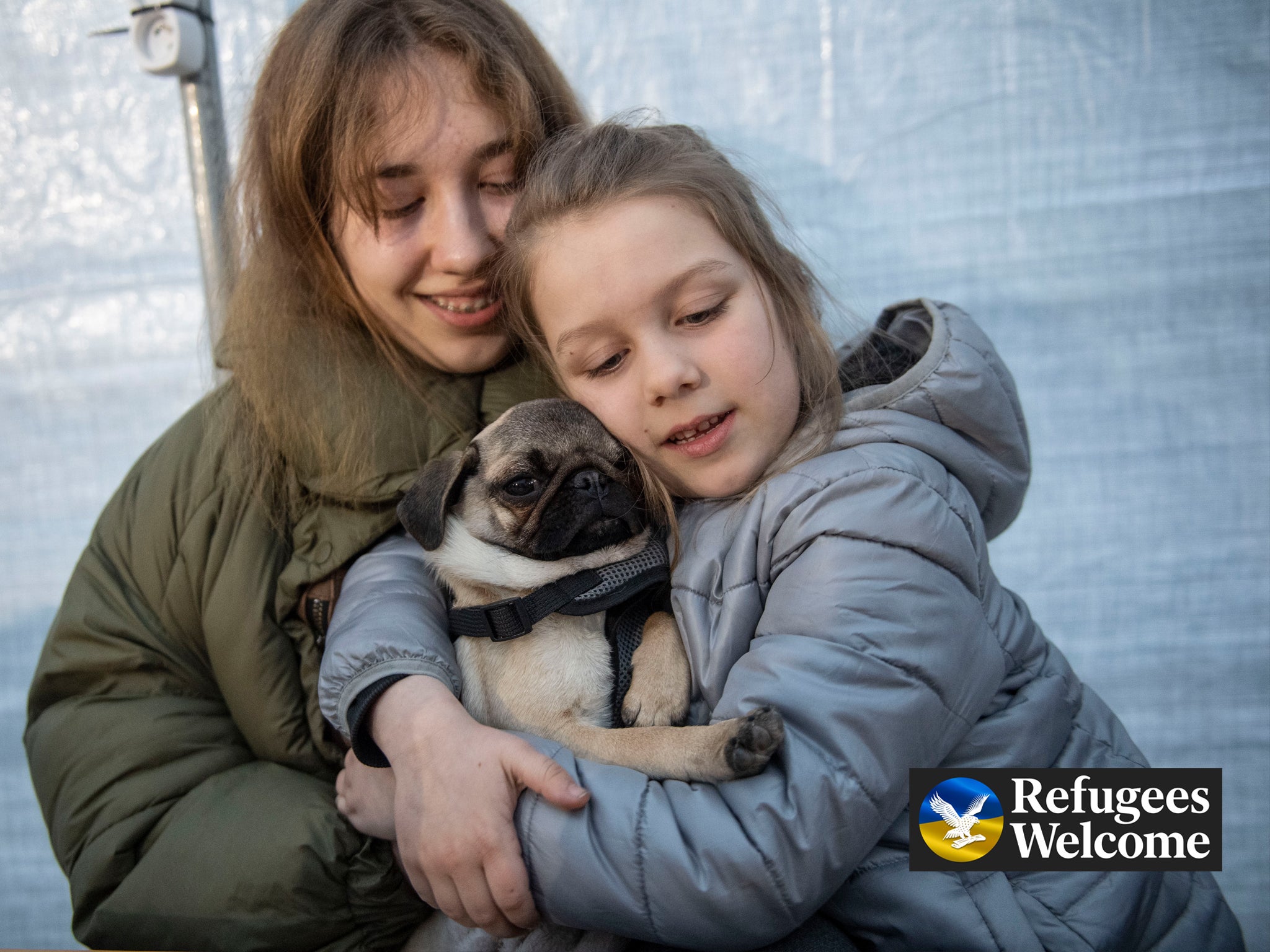
Your support helps us to tell the story
From reproductive rights to climate change to Big Tech, The Independent is on the ground when the story is developing. Whether it's investigating the financials of Elon Musk's pro-Trump PAC or producing our latest documentary, 'The A Word', which shines a light on the American women fighting for reproductive rights, we know how important it is to parse out the facts from the messaging.
At such a critical moment in US history, we need reporters on the ground. Your donation allows us to keep sending journalists to speak to both sides of the story.
The Independent is trusted by Americans across the entire political spectrum. And unlike many other quality news outlets, we choose not to lock Americans out of our reporting and analysis with paywalls. We believe quality journalism should be available to everyone, paid for by those who can afford it.
Your support makes all the difference.The abandoned dog at the Hungarian border was in a bad way, shaking and shivering and barely able to walk.
The Golden Retriever had pitched up seemingly out of nowhere that morning, passing through no-man’s land to lay his weary head on a piece of covered tarmac just past the Csengersima checkpoint on the Hungarian-Rumanian border.
A woman from the Hungarian Red Cross bent down to offer him food, water and a kind word, but he was too weak to respond, so they called a local animal shelter to pick him up. Six hours later, he was still there.
It was a pitiful sight but also one that flew in the face of the extraordinary care we had seen the Ukrainian refugees show for the pets they had brought with them to escape the Russian bombs.
We had witnessed this during the second week of the invasion at several crossings on the Polish-Ukrainian border and again, in the last week at the Hungarian border – and many told us of the pain they felt about larger pets, mostly dogs, they had been forced to leave behind.
We watched as refugees who had queued for hours on foot carrying young children and their worldly possessions still found the wherewithal to physically carry their pet, often lugging them in pet carriers along with weighty supplies of pet food.
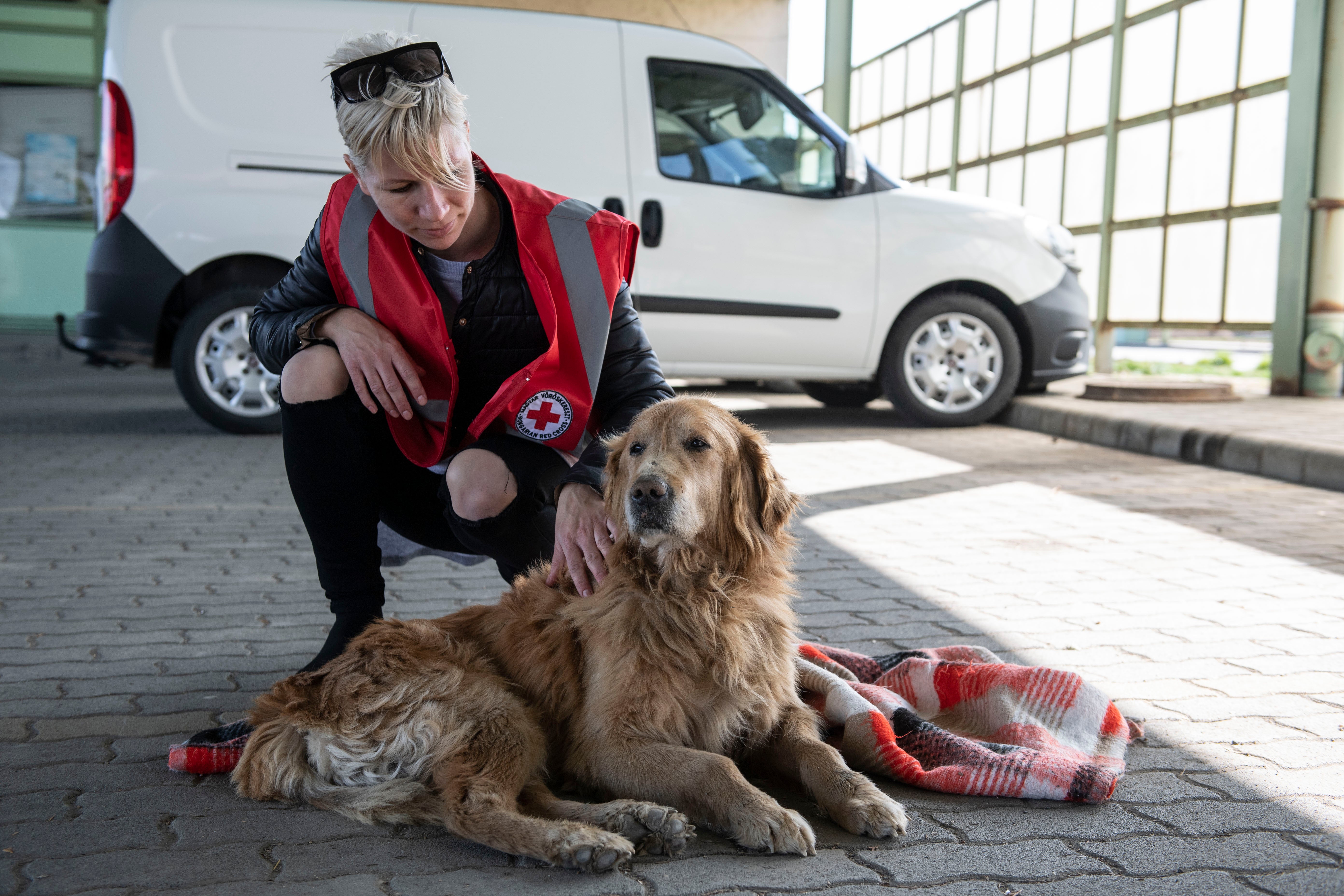
Frequently the ones carrying the pets were young children. Nobody knows exactly how many of the 4 million refugees who fled the country have taken pets, but pet travel specialists PBS Pet Travel estimate that more than 1.25 million pets have crossed the border.
One of the untold stories of this war is surely that of how taking care of a beloved pet at a time of personal and collective trauma can be a helpful, even healing, thing to do.
At Kroscienko on the Polish-Ukrainian border, where refugees endured sub-zero temperatures, we saw Olena Boiko, 39, emerge from her 20-hour journey from Kyiv with her Chihuahua, Dolores, peeking out of her coat.
At the same crossing we saw Vatazhok, 87, on crutches and her friend, Zhanna Zabrodska, 85, in a wheelchair, muster the energy to carry their respective cats, Syoma and Masha.
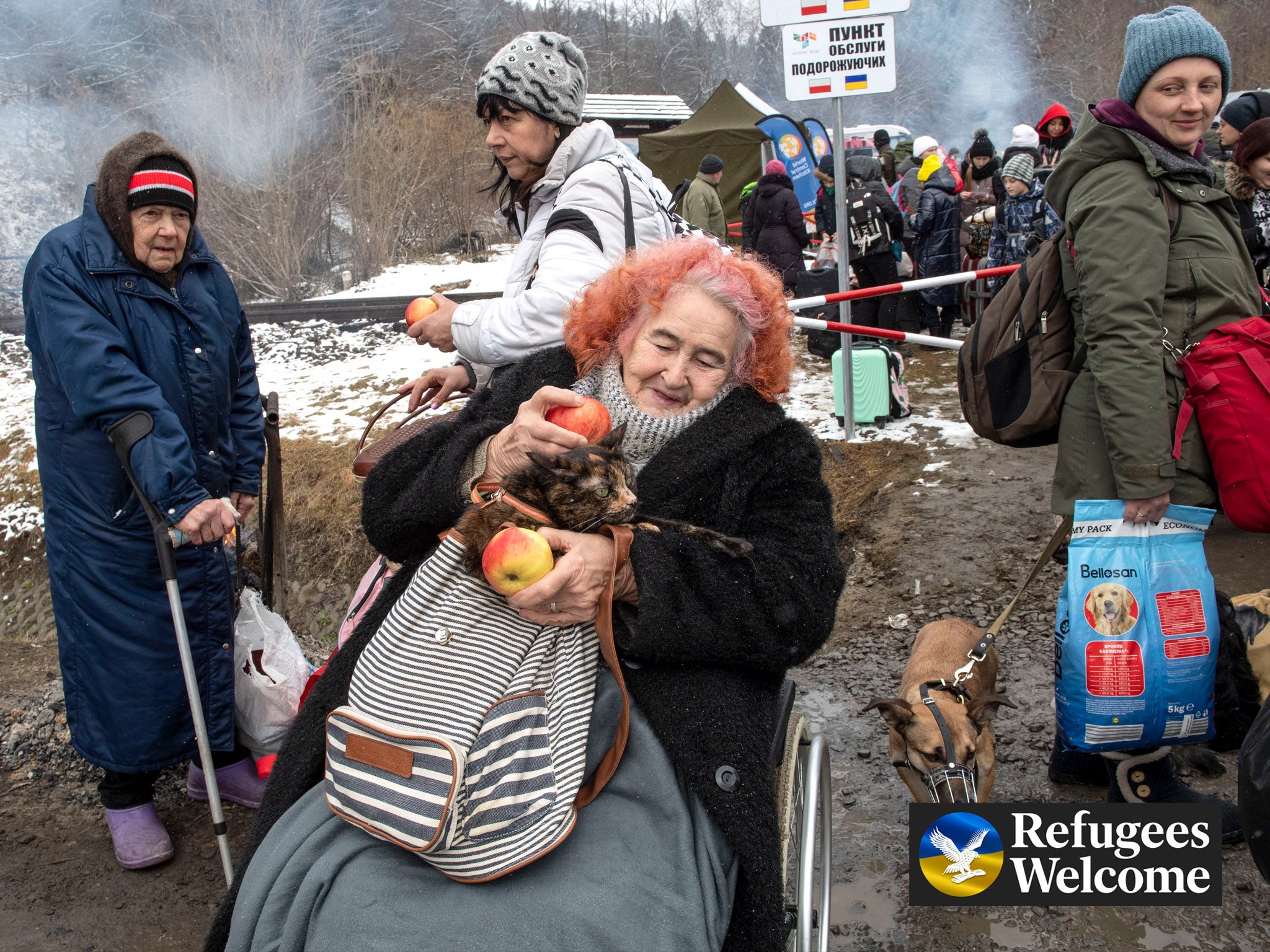
“Come feel Masha shivering with cold through my rucksack,” said Zhanna, tears streaming down her face for her struggling feline companion. The gritty octogenarians had travelled two days from embattled Kharkiv in the north after hiding in a freezing basement for 11 days and in fleeing to save themselves had thought to save their cats too.
There was also sadness for pets left behind. When Sasha Bubnovska, 28, crossed into Poland with her daughters Sofia, 6, and Mia, 2, and pug, Bella, after a four-day journey fleeing Irpin and leaving her husband at the border, her relief to be safe was palpable, but her thoughts were for her black Labrador, Clode, too big to fit in their car.
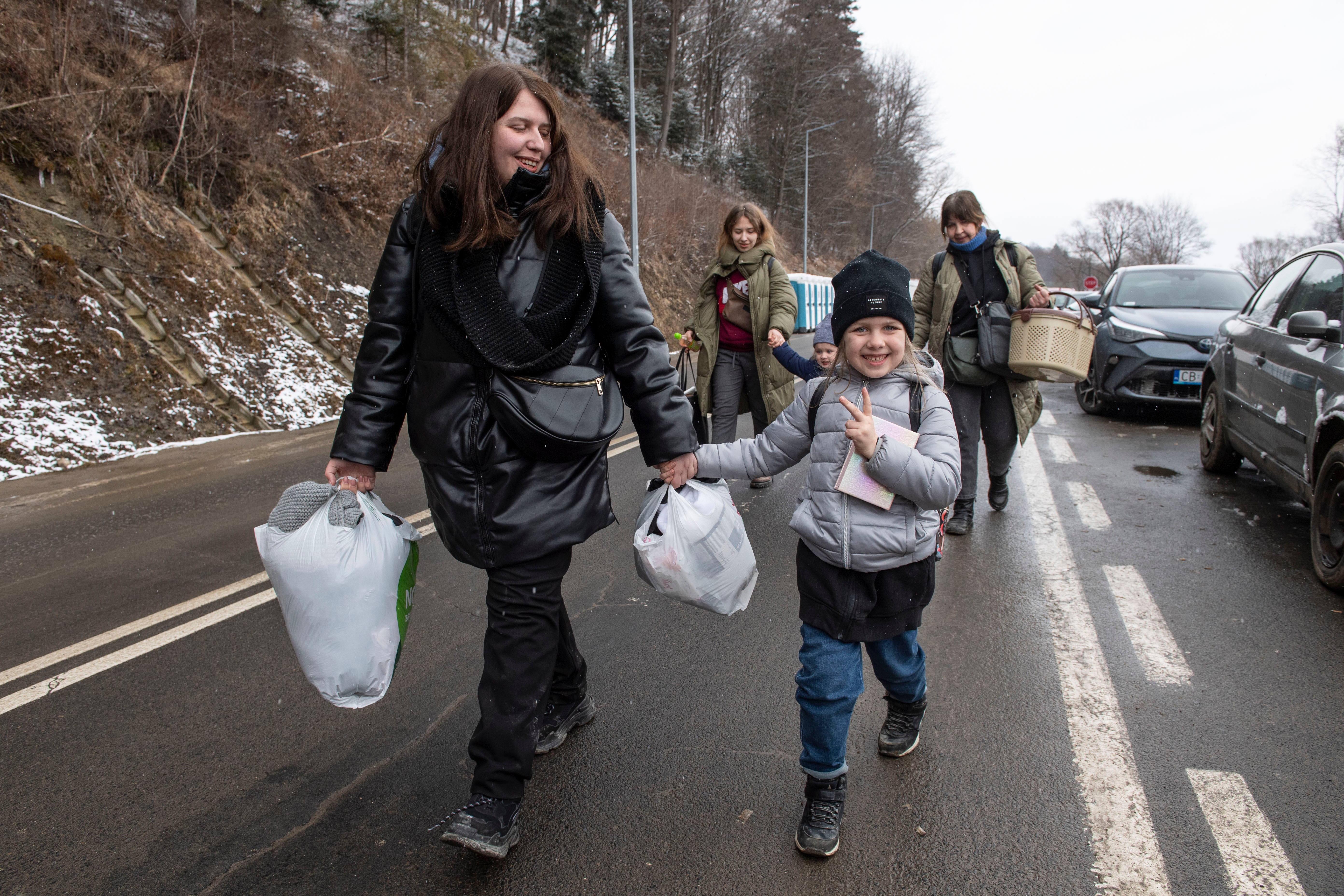
She showed me photos of Clode looking mournful as they left him lying on his own in front of the sofa. Sasha said: “It is hard to look at these photos.”
They left house keys with a neighbour and asked him to put out food and water for Clode, but Sasha did not know the neighbour well and with Kharkiv under bombardment, she couldn’t be sure if Clode was still alive. “I am not sure I will see him again,” she said. “We brought Bella but Clode was part of our family. I feel I betrayed him.”
At a nearby refugee reception centre in Lodyna just over the Polish border, a young girl arrived with her mother after a long journey from eastern Ukraine and the first thing she did after being given a camp-bed was to feed and cuddle the rats in her pet carrier.
They immediately became a focal point and a way of connecting to other refugee children in the shelter. Elsewhere we saw several hamsters and even mice.
At the cavernous Bok Stadium in Budapest, a national sports centre being used as a filtration point for thousands of refugees arriving at Budapest train station, one of the charities was Animal Aid.
The Independent has set up a petition calling on the UK government to be at the forefront of the international community offering aid and support to those in Ukraine. To sign the petition click here.
They had set up a stand offering free pet food, professional advice and veterinary information.
A spokesman said: “Ninety-nine per cent of the pets people have brought are dogs and cats, but we are seeing the odd rat.”
He held up a pet carrier with a very busy white rat that somebody had found abandoned and handed in just minutes before.
“It’s in good shape,” he said. “The cage is clean and well looked after. We don’t know if it was left behind on purpose or accidentally.”
Other refugees were letting their canine pets stretch their legs and as they strutted across the blue floor of the sports centre alongside their owners, they looked as happy and well looked after as contestants for a Crufts international dog show at Alexandra Palace.
Initially the EU had imposed no limits on the number of pets refugees could take with them, and border officers allowed them to cross without papers, but according to anecdotal reports from aid volunteers, limits have now been imposed, not just at the Ukrainian border but in some onward countries, and this had led to a rise in pets being abandoned at the border.
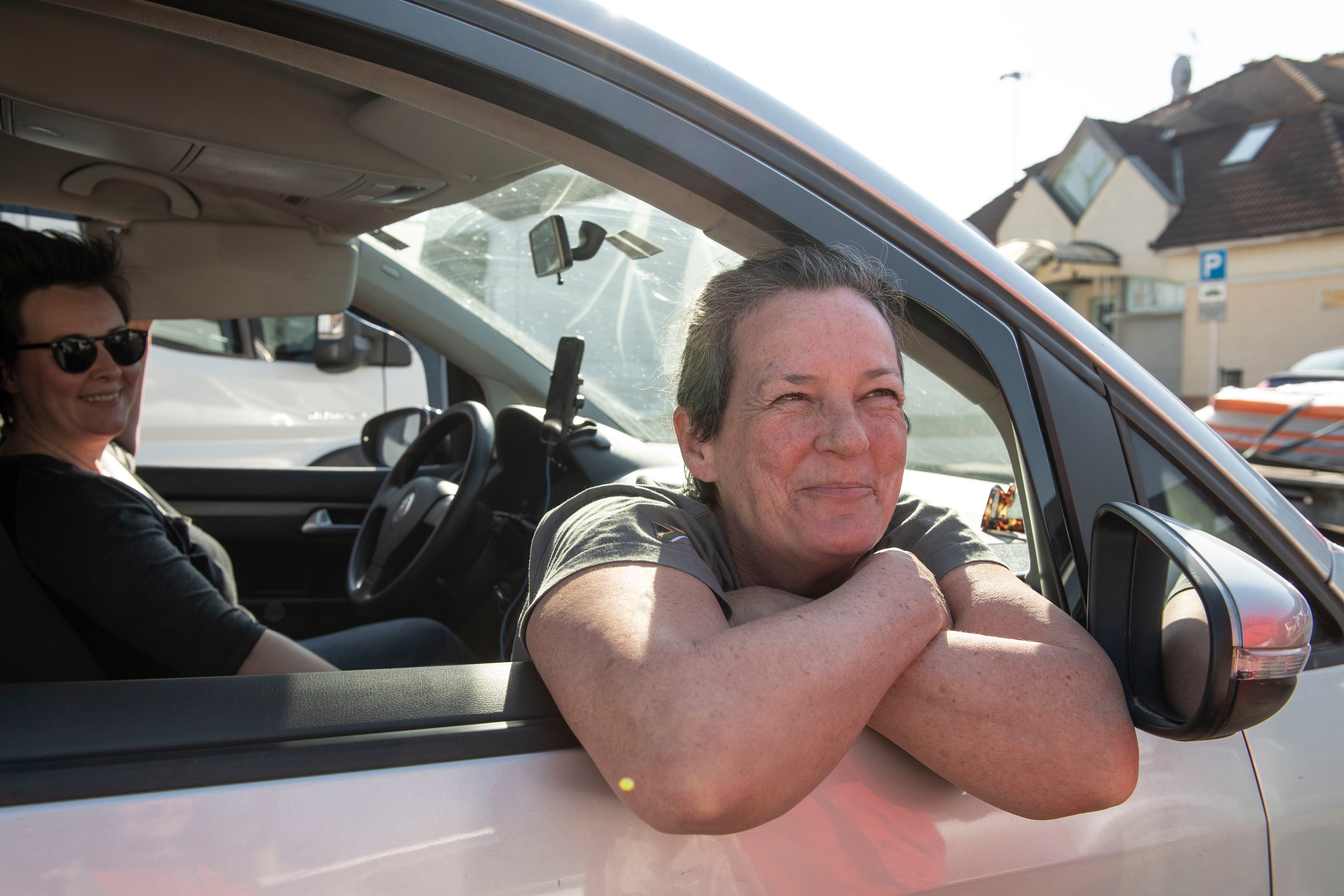
Hester Berg, a volunteer who since the war began has driven four times from her home in Vienna to various points on the Ukrainian border to deliver a car full of pet food, said: “Refugees have told us that they have changed the laws regarding pets. Initially you could have five animals per car but now they’ve cut down so some refugees are having to make a choice at the border between which pets to take and which to leave behind. In other cases, they get their pets through the Ukrainian border only to face a limit at the second EU country they enter. We have rescued 25 dogs at various border crossings. It’s heart-breaking.”
The Independent has a proud history of campaigning for the rights of the most vulnerable, and we first ran our Refugees Welcome campaign during the war in Syria in 2015. Now, as we renew our campaign and launch this petition in the wake of the unfolding Ukrainian crisis, we are calling on the government to go further and faster to ensure help is delivered. To find out more about our Refugees Welcome campaign, click here. To sign the petition click here. If you would like to donate then please click here for our GoFundMe page.
Join our commenting forum
Join thought-provoking conversations, follow other Independent readers and see their replies
Comments